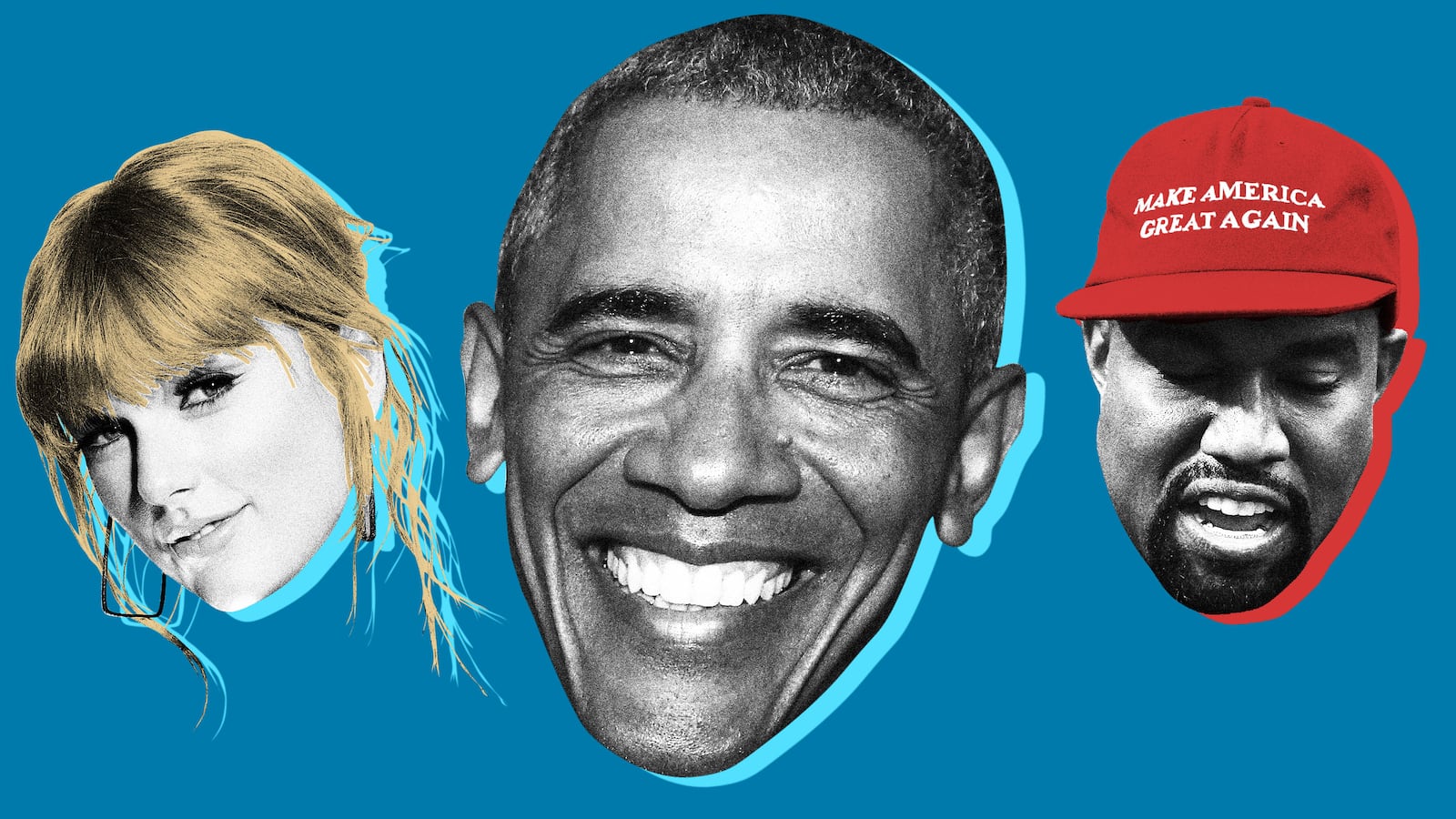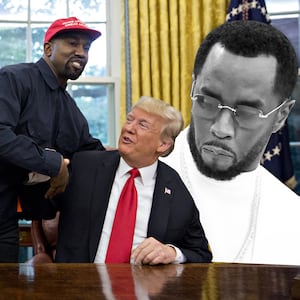The antics of Kanye West have been playing on a constant loop in the collective brain of American culture for the better part of six months. With his ever-present MAGA hat and public displays of Trump love, he’s become the bane of so many of his former fans, musical peers and commentators. Things reached a bizarre crescendo this week, when Yeezy turned up at the White House alongside NFL legend Jim Brown to have a lunch meeting with Trump.
During the strange media circus that followed, Kanye praised Trump (“I love this guy”), denounced the Hillary Clinton campaign slogan as lacking in “male energy,” bemoaned black Americans’ supposed obsession with racism (“We really get caught up in the idea of racism over the idea of industry”) and supposed dependence on welfare—all as Jim Brown sat to his left, nodding in agreement and as Trump, sometimes uncomfortably, grinned in delight, with press surrounding the three of them, soaking in every rambling word.
It was a peculiar spectacle, and the kind of thing that Trump seems to invite by his very existence in the White House. The president is, after all, a celebrity first—a wannabe tycoon who loved to schmooze with the Hollywood elite long before he became the host of an obnoxious reality show. He and Kanye West have never been strange bedfellows—they’re practically fraternal twins. But it’s unnerving to see how intensely committed Kanye has become to this president, going so far as to hug him and effusively praise him for making “me feel like Superman” via the red hats emblazoned with Trump’s empty-but-loaded “Make America Great Again” slogan.
Trump asked West “how does it feel to be in the Oval Office,” and it was even more uncomfortable watching a sitting president basking in the affection this prominent black man was lavishing upon him. It would have been awkward in any context, but for said praise to be heaped on a man who assisted in marginalizing low-income black renters in the 1970s, called for the execution of the Central Park 5 in the late 1980s, and beat the drum for birthers during the Obama years made for a viewing experience that’s hard to describe.
And therein lies another element of West’s commitment to fawning over Trump: West has always needed to feel validated by those he perceives to have power and status. He needed it from fashion moguls. He needed it from Jay-Z. He needed it from Silicon Valley. And he needed it from Barack Obama, the former president who famously called the rapper a “jackass” back in 2009.
While taping a CNBC interview that year, the then-president was caught on-camera behind the scenes dissing Kanye following West’s infamous upstaging of Taylor Swift at the 2009 MTV Video Music Awards. It was an indiscretion that spread like wildfire, amplifying the outrage over Kanye interrupting Swift’s acceptance speech after she’d won Video of the Year.
Following the Obama video going viral, Kanye told XXL: “The president has way more important stuff to worry about than my public perception.” But Obama reiterated his stance three years later, when asked to choose between West or his then-Watch The Throne compadre, Jay-Z.
“Jay-Z,” Obama told David Samuels in an interview for The Atlantic. “Although I like Kanye. He’s a Chicago guy. Smart. He’s very talented.” When reminded of his earlier statement, Obama said, “He is a jackass. But he’s talented.”
In George W. Bush, Kanye had a president whom he made feel inadequate. And in Obama, Kanye had a president who dismissed him outright. Now, Kanye has a president who makes him feel important. And it’s that ego-driven power trip that seems to be driving so much of this sideshow.
“Right now, you gave me the heart to go to Adidas,” West told Trump, referencing his partnership with the sneaker giant. “Because at Adidas, when I went in, in 2015, we were a $14 billion company losing $2 billion a year. Now we have a $38 billion market cap. It’s called the ‘Yeezy effect.’”
“And I went to Kasper [Rørsted]. We had a meeting in Chicago. And I said, ‘You have to bring manufacturing onshore.’ And not even shore; into the core. It’s not about the border; it’s the core of Adidas. And Chicago is the core of Middle America. And we have to make Middle America strong.” (West’s Yeezy sneakers are currently made in China.)
Kanye’s Trump meeting was peppered with mentions of incarcerated former Gangster Disciples head Larry Hoover, stop-and-frisk policies in Chicago, the prison industrial complex and the Democratic Party’s exploitative relationship with black constituents. There’s validity in addressing all of those issues and they really seem to matter to West. But his vapid proclamations about “love” while kissing the ring of a president who supports stop-and-frisk and advocated for the jailing of black protesters, run counter to his stated goals. It’s hard to believe that he could be so oblivious to that.
Right-wingers were quick to praise Kanye’s meeting with Trump—some of the very same people who took exception to Obama White House invitations to Common and Jill Scott—while railing against Swift for backing Tennessee Democrats in the midterms.
But West’s behavior, as has been the case for so many years, left fans and contemporaries confused and outraged.
On Instagram, T.I. railed against West, sharing his “disgust at [the most] repulsive, disgraceful, embarrassing act of desperation & auctioning off of one’s soul to gain power I’ve ever seen.”
“At one time it was a pleasure to work alongside you… now, I’m ashamed to have ever been associated with you.”
This Kanye sideshow won’t be going away anytime soon. He’s sucking up too much of the national conversation and we can’t seem to look away. He’s become the right’s favorite rapper, and he’s correct in stating that bipartisan rhetoric gets nothing done. But there isn’t anything he’s doing that seems to be in line with actually dismantling the policies he’s railing against.
It feels like he’s just giddy that the president “likes” him; most enthused about the fact that he can be close to the seat of power. It’s too bad that Kanye doesn’t understand that, in playing politics with this president, he’s relinquishing too much of his own power.
Editor’s Note: This article previously misidentified Larry Hoover as former head of the BMF. We regret the error.







